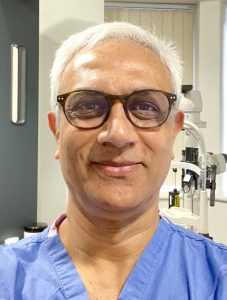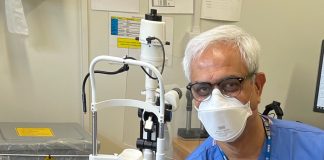Today, on 5 July 2023, the NHS completes 75 years of serving people and saving lives. All these 75 years, NHS has been on the forefront in providing help to people with medical emergencies. NHS has been a flag-bearer of saving lives during the deadly pandemic which swept the globe.
As NHS marks its 75-year anniversary, we at Asian Standard have chosen to pay respects to all medical warriors from South Asian community, who have been a part of the selfless service and have always strived to keep service before self.
Asian Standard spoke to Professor Faruque Ghanchi consultant ophthalmologist at Bradford Teaching Hospitals NHS Foundation Trust since 1999.
Prof Ghanchi’s journey in the medical field starts from India.

Image: Prof Ghanchi
Prof Ghanchi says, “So, I grew up in India, at a time when there was a growing need for medical care, globally. Initially I did my training in ophthalmology in India. Then in 1989, after coming to UK I did a further training in the field. I went on to do my higher surgical training in Glasgow, and then returned to Yorkshire in 1999. I was in Doncaster for a bit, and then later joined Bradford as a consultant ophthalmology in December 1999.”
“My journey starting from India, where resources were limited, to UK, where I experienced new kinds of research. This has been helpful for me in bringing all my experience into my clinical practice.”
Coming from India, Prof Ghanchi had to face a complete change in terms of culture and environment. He speaks about the challenges for a newcomer in the 90s, “The first hurdle any new applicant is to break through into the system and get an opportunity to start working in a new environment, and that requires preparation. You need to prepare yourself for failures, you have to go through a number of interview processes, preceded by certain exams that, you require in United Kingdom to practice. Once you’re in the support that you get from the college, colleagues and others helps you get through.”
“Of course, there are challenges, there are different preferences for different individuals, and if you work through that with your dedication, hard work and commitment, you will go through it.”
Prof Ghanchi went on to speak about the changes he saw in his field, within the NHS from 1999 to 2023. “When I started, we used to have patients in hospitals, they used to stay for three days, around the cataract operation time, moving forward to 2023, the operations are done with the latest procedures, in most cases patients take just about an hour or two, get the operation done and go home. Now, the individual recovery is quick. Patients occupied beds for three days earlier, now those beds can be used for others who need them.”
Prof Ghanchi played a big role in establishing the first centre to provide PDT for macula degeneration in Yorkshire in 2001.
“Looking back”, Prof Ghanchi says, “I am very proud of that achievement. As a result, we now have a centre, where hundreds and thousands of patients with macula conditions have been treated.”
Seeking to inspire the younger generations from the South Asian community, Prof Ghanchi says, “I think there is a bright future for talented and enthusiastic clinicians, whichever part of the world they practice in. The growth in technology is giving us a huge opportunity in preventing number of diseases. What the younger people can do is to believe in themselves, have faith in the system and explore the opportunities where they can employ new tools in advancing clinical trials and clinical practices.”




